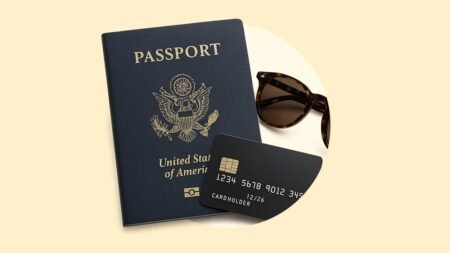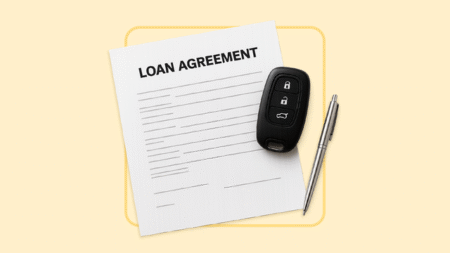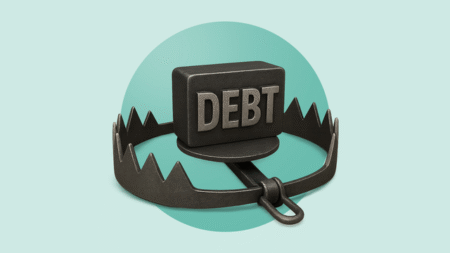Key takeaways
- To pay off debt, you need to know how much you owe, how much you’re spending and where you can cut costs.
- The debt avalanche and snowball methods are popular debt repayment strategies.
- A debt consolidation loan can combine your debts into one loan with one interest rate and payment.
Paying off debt requires commitment, patience and a little bit of grace. You’ll need to check in with yourself, carefully review your current finances and utilize the strategies and tools you have at your disposal. With this information, you can create and implement a successful debt repayment strategy to help you pay debt off and build healthy financial habits along the way.
How to pay off debt: Steps to take now
Starting your debt payoff journey can feel intimidating and overwhelming, especially if you only look at your total debt. Taking it step-by-step can ease those feelings.
“Stop looking at the total number every day,” says Bernadette Joy, Bankrate expert contributor and founder of Crush Your Money Goals. “That’s like staring at the top of a mountain instead of taking the first step.”
The first step is deciding you want to tackle your debt. From there, the debt payoff journey requires five actions.
- Perform a self-audit
- Figure out what you owe
- Review your spending
- Create a more intentional budget
- Choose a debt payoff strategy
Joy recommends taking on each action separately and remembering the big picture. “Focus on one chunk at a time,” she says. “Keep your goals front and center, not just the balances.”
1. Perform a self-audit
Before diving into your debt, think about your beliefs about debt and what you say to yourself, recommends Rita-Soledad Fernández Paulino, Bankrate expert contributor and founder of Wealth Para Todos.
“Being aware of what your thoughts are is important because it could impact the way you approach implementing a debt payoff plan,” they say. “Some people will approach it with a lot of urgency and self-criticism. And you can pay off your debt in that way, but is that the way you want to do it? You can choose to pay off your debt in a way that’s a lot more gentle and not so alarming to your nervous system.”
Joy agrees with the gentle approach, acknowledging that debt can cause damage to more than just finances. Part of her debt payment method includes “healing money wounds,” by asking yourself why you may have accumulated debt, what stress it caused and what you’ll change once it’s cleared.
Give yourself grace. Debt is something you have, not who you are.
— Bernadette Joy, Founder of Crush Your Money Goals
Being aware of your habits and feelings around money and giving yourself grace can help flip your internal dialogue. By performing a self-audit, you can feel more motivated and see what other areas of life you can work on to help with your debt payoff plan.
2. Figure out how much you owe
Next, you’ll need to determine the exact amount of your debt. This could seem overwhelming. However, that knowledge can be empowering, giving you a starting point to plan your way out.
The moment you decide to pull your credit report and look at all your debt and then look at your interest rates, you’re already winning, because you’re no longer avoiding.
— Rita-Soledad Fernández Paulino, founder of Wealth Para Todos
In addition to focusing on the dollars owed on each account, pay attention to:
- Loan interest rates
- Minimum monthly payment requirements
- Payment due dates
- Final payment due date/repayment term
You’ll need all of this to determine how you’ll pay these debts and which debt you’ll prioritize first.
3. Review your spending
Once you know your debt to the dollar, the next focus should be your expenses other than debt. Go through and group your purchases into specific categories. Such categories include: groceries, gas or transportation, clothing, entertainment and pet needs.
Review your spending for the last three months to get an idea of what you spend your money on, how much you spend, where you’re overspending and where you may be able to save.
4. Create a more intentional budget
A budget tells your money where to go and helps you avoid overspending. Typically, a budget prioritizes your required expenses, including your mortgage, basic living needs and minimum debt payments. The money left over can go to your discretionary spending, like entertainment and clothing. An intentional budget goes a step further, separating required expenses and discretionary spending into smaller, more specific categories and assigning dollar amounts to each one.
Keep in mind:
You can budget on paper or with a budgeting app. If you want to develop a budget planner, templates are available in Excel, Microsoft Office, Google Sheets and others.
By reviewing and tracking your spending from step three, you’ll have an idea of how much you should assign to each category. Be honest with yourself and use this first budget before seeing where you can make cuts. Once you lower the amount budgeted for specific categories, put the amount you cut toward your debt payments.
While most spending cuts will take place in discretionary spending, there are ways you can decrease your mandatory spending as well.
Examples of how to save include:
- Buy generic brands
- Dine out less frequently
- Meal plan and grocery shop with a list
- Bring coffee and lunch from home
- Cancel unused subscriptions and memberships
- Reduce your electricity or water use
- Change providers, including cable and cell phone carriers
- Carpool or take public transportation to reduce fuel use
- Shop for clothing and accessories at thrift stores and consignment shops
- Participate in cooperatives
- DIY when possible
If you need to make more money, there are ways to add to your income. Just make sure you include that income in your budget if you aren’t putting all the money toward paying off your debt.
Ways to add to your income
- Ask for a raise or extra hours, if applicable
- Consider a part-time job or side hustle
- Sell things you no longer want or need
- Rent out a room, car, RV or other asset
- Take online surveys
- Use windfalls, like tax returns and work bonuses
- If needed, open a bank account with a welcome bonus
5. Choose your debt payoff strategy
Once you organize your finances, have a plan for your spending and make room in your budget, it’s time to determine how to apply that extra money toward your debt. While the two common debt repayment strategies are the snowball and avalanche methods, you can also use a personal loan to help pay off your debt. These are just a few strategies to help you pay debt off fast. Research others and combine strategies to find the best fit for your goals.
Money tip:
Make biweekly payments instead of monthly to add one extra payment to your debt each year. This can reduce your loan term and save you thousands in interest.
Other debt relief options
Debt management
With a debt management plan (DMP) a counseling agency helps you develop a budget and negotiates with creditors to waive fees and lower your interest rates. Instead of paying creditors directly, you’ll pay the agency a lump sum each month, and the agency will pay the creditors on your behalf. You may pay a fee for these services, which is part of the monthly payment.
Debt settlement
A debt settlement program involves negotiating with creditors to settle for less than the amount owed. A third-party debt relief company can work with the creditors on your behalf, or you can negotiate on your own to avoid paying for the service. The end result may include a reduced balance, lower interest rates and/or reduced or waived fees. However, you may be taxed on the forgiven amount and your credit could take a hit.
How to stay motivated while paying off debt
No matter the strategy for getting out of debt, the process for becoming debt-free may take a significant amount of time. Stay motivated along the way by remembering the benefits of paying off debt. Not only will you feel less stress and anxiety, but you’ll also free up money to put toward saving, investing and other goals.
Along with knowing the benefits, knowing the various free resources available to help can also make a big difference. Paulino recommends reading articles from Bankrate, listening to podcasts and audiobooks or checking out finance books for free from your local library.
The experts also recommend rewarding yourself for small wins and finding a community to cheer you on.
“I remember just having to really listen to a lot of people who said, like, this is a good idea,” says Paulino of her own debt payoff journey. “We live in a society that [says] ‘spend, spend, spend,’ and you have to be aware of what you’re consuming, because to pay off debt is very atypical, it’s not the norm.”
If debt is the norm, who wants to be normal?
Why we ask for feedback
Your feedback helps us improve our content and services. It takes less than a minute to
complete.
Your responses are anonymous and will only be used for improving our website.
Help us improve our content
Read the full article here

















